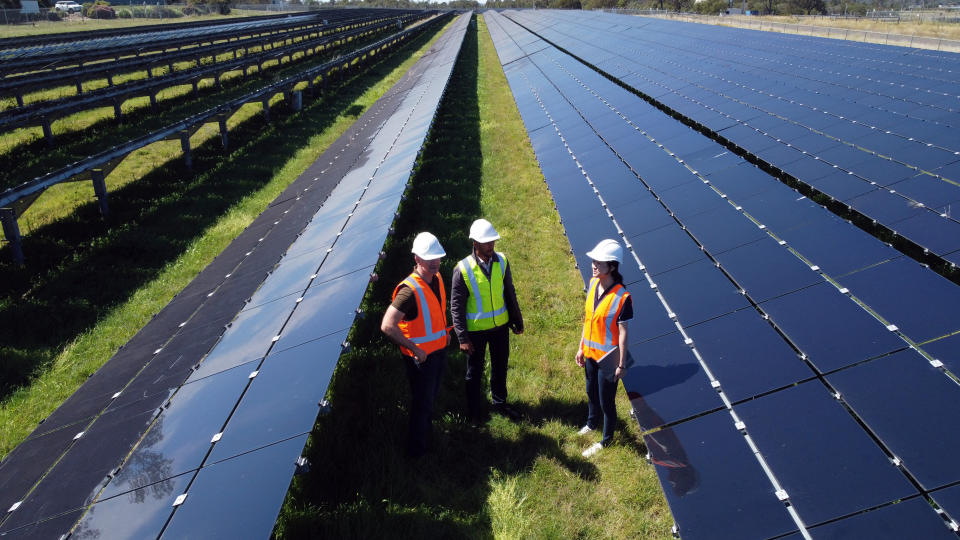3 High-Yield Dividend Stocks That Could Soar More than 20%, According to Wall Street

The Rolling Stones were right when they sang, "You can't always get what you want." But can't doesn't mean never. Sometimes, you can get what you want.
Income investors want solid income (of course). However, they also like their investments to grow. However, they must often trade off growth in exchange for higher income. But some stocks offer both. Here are three high-yield dividend stocks that could soar more than 20%, according to Wall Street.
1. Brookfield Renewable
Brookfield Renewable's (NYSE: BEP) (NYSE: BEPC) forward distribution yield stands at nearly 5.9%. That's actually the yield for the limited partnership (LP), which trades under the BEP ticker. The corporate entity, which trades under the BEPC ticker, has a forward yield of a little over 5%. I doubt income investors will turn their noses up at either distribution.
Granted, they probably won't like Brookfield Renewable's recent stock performance. Both stocks of the renewable energy provider are down year to date. However, the average price target of analysts surveyed by LSEG reflects an upside potential of more than 21% over the next 12 months for both the LP and corporate stocks.
Can Brookfield Renewable really deliver such a hefty gain? I think it's possible. The demand for renewable energy is rising. Brookfield's acquisitions should fuel its growth, especially with its acquisition of around 53% of global renewable energy provider Neoen expected to close in the fourth quarter of 2024.
Even if Brookfield Renewable doesn't hit analysts' expectations, though, income investors can count on its distributions. Roughly 90% of the company's cash flows are contracted, which translates to reliable distributions. Since 2001, Brookfield Renewable has increased its distribution per unit by a compound annual growth rate of 6%. It targets annual distribution growth between 5% and 9% over the long term.
2. Chevron
Chevron (NYSE: CVX) has been a favorite for many income investors for decades. That's still the case, with the oil and gas giant boasting a forward dividend yield of 4.5%.
Although Chevron's shares were up by more than 10% year to date in early May, they've since given up all of those gains and then some. Wall Street remains bullish despite the recent decline. Of the 24 analysts surveyed by LSEG in August, 16 rate Chevron as a "buy" or a "strong buy." The average 12-month price target for the stock is nearly 21% above the current share price.
There's some uncertainty about Chevron's pending acquisition of Hess. ExxonMobil claims a right of first refusal over Hess' 30% stake in a joint operating agreement in Guyana. The issue is going to arbitration with a hearing scheduled for next year. Should ExxonMobil win in this dispute, Chevron has said it would abandon its effort to acquire Hess.
However, Chevron doesn't need to acquire Hess for its stock to perform well going forward. And it definitely can continue to pay its juicy dividend regardless of what happens on the mergers and acquisitions front.
3. Devon Energy
Devon Energy's (NYSE: DVN) forward dividend yield is hard to nail down. Why? The company's dividend consists of two components -- a fixed portion and a variable portion based on excess free cash flow. However, I think investors can count on Devon to deliver a yield of at least 4% and perhaps much higher.
The future performance of any oil stock is even more difficult to predict. Like Chevron, Devon has taken investors on a roller coaster ride this year with its shares soaring by double-digit percentages then falling. Analysts, though, look for the ride to become fun again. The average 12-month price target for Devon reflects an upside potential of nearly 29%.
I'm not sure if Devon will achieve those kinds of gains over the next 12 months. However, I wouldn't rule out the possibility. The company's oil production reached an all-time high in Q2. Devon raised its full-year 2024 production outlook. Its acquisition of Grayson Mill Energy's Williston Basin business, which should close in Q3, will significantly boost the company's production capability.
Investors could also benefit from an "invisible" dividend -- Devon's stock buybacks. The company recently expanded its share repurchase authorization by 67% to $5 billion. Devon bought back $2.7 billion of stock in the first half of this year.
Should you invest $1,000 in Brookfield Renewable Partners right now?
Before you buy stock in Brookfield Renewable Partners, consider this:
The Motley Fool Stock Advisor analyst team just identified what they believe are the 10 best stocks for investors to buy now… and Brookfield Renewable Partners wasn’t one of them. The 10 stocks that made the cut could produce monster returns in the coming years.
Consider when Nvidia made this list on April 15, 2005... if you invested $1,000 at the time of our recommendation, you’d have $779,735!*
Stock Advisor provides investors with an easy-to-follow blueprint for success, including guidance on building a portfolio, regular updates from analysts, and two new stock picks each month. The Stock Advisor service has more than quadrupled the return of S&P 500 since 2002*.
*Stock Advisor returns as of August 12, 2024
Keith Speights has positions in Brookfield Renewable, Brookfield Renewable Partners, Chevron, Devon Energy, and ExxonMobil. The Motley Fool has positions in and recommends Brookfield Renewable and Chevron. The Motley Fool recommends Brookfield Renewable Partners. The Motley Fool has a disclosure policy.
3 High-Yield Dividend Stocks That Could Soar More than 20%, According to Wall Street was originally published by The Motley Fool
Breaking news
See all






